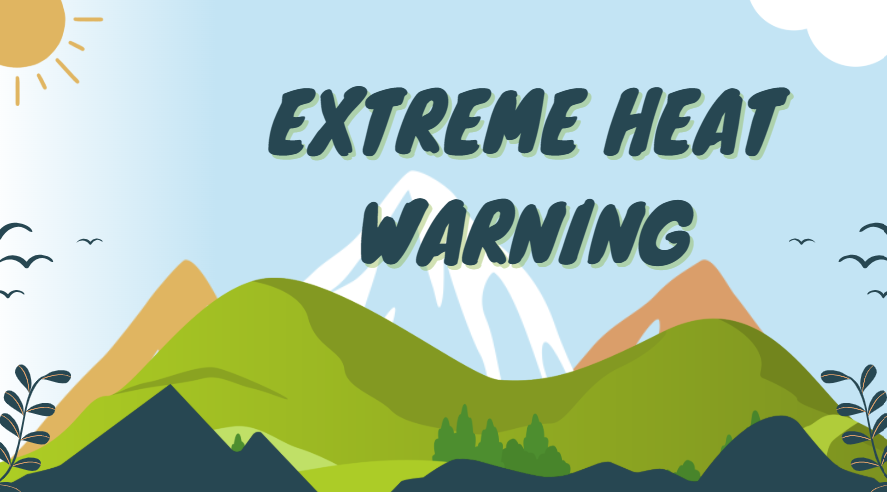Extreme Heat Warning are serious alerts from weather officials. They mean the heat could harm your health. This guide explains what these warnings are, why they matter, and how to keep yourself and others safe.
ALSO READ : Jump Stars Codes
What Is an Extreme Heat Warning?
An Extreme Heat Warning is issued by the U.S. National Weather Service when:
- The heat index (how hot it really feels with humidity) reaches 105°F (≈40.5°C) or higher for more than three hours across two days, OR
- Any time it goes above 115°F (46°C)
There’s also an Extreme Heat Watch, used when dangerous heat is expected soon—typically heat indexes from 95°F to 100°F (35–38°C)..
These alerts give people time to prepare before conditions become life-threatening.
Why Is Extreme Heat So Dangerous?
Health Risks
- Heat exhaustion: symptoms include heavy sweating, weakness, dizziness, headache, nausea, and cramps. Without treatment, it can become heatstroke.
- Heat stroke: life-threatening: life-threatening body temperature, confusion, seizures, and dry skin. Get help right away.
Secondary Dangers
- Strains on infrastructure: rails and roads can buckle; power systems may fail due to high demand
- Environmental harm: wildfires, polluted water, and worsening air quality often follow heat waves (en.wikipedia.org+12, reuters.com+12, redcross.org+12)(en.wikipedia.org+12, reuters.com+12, redcross.org+12)
Climate Connection
Extreme heat events are increasing in frequency. Scientists say climate change is a major driver. By 2055, 63%of Americans could face 3+ days a year above 100°F (washingtonpost.com)shingtonpost.com).
at Risk?
- Older adults: bodies don’t adjust temperature well..
- Young children & babies: they cannot cool themselves properly..
- Outdoor workers: exposure to sun/humidity increases danger.. washingtonpost.com
- People with health issues or certain meds: heart andand lung problems, diabetes, and meds can heighten risk..
- Pets: Animals feel heat quickly. Don’t leave them in hot cars..
How to Prepare Before the Heat Hits
Hydration & Supplies
- Drink water constantly—even before you feel thirsty.
- Use sports drinks to replenish salt and minerals..
- Stock up on water, electrolyte drinks, battery-powered radios, and cooling options like damp towels..
Your Home
- Close blinds and curtains to keep out heat.
- Use attic fans or improve insulation
- Check your air-conditioning or identify public cooling places like malls or libraries (health.com+8ready.gov+8yalemedicine.org+8)(health.com+8ready.gov+8yalemedicine.org+8)
- Plan & Communicate
- Learn to recognize heat illness signs.
- Make a plan to stay in touch with neighbors and help others in in time.
- Know where to find weather alerts such as watches and warnings
What to Do During an Extreme Heat Warning
- Stay inside in cool, indoorspaces as much as possible..
- Avoid outdoor exercise or work during midday; instead,, go early or late (redcross.org+1ready.gov+1)(redcross.org+1ready.gov+1)
- Take regular breaks in shade or cool areas.
- Cool your body: take showers, soak your feet or arms, use damp cloths and fans
- Check on others: especially older adults, children, and pets..
How to Treat Heat-Related Illness
Heat Cramps
Signs: muscle spasms with sweating.
Fix: Move to a coolol spot, hydrate with water or sports drinks, and restest.
Heat Exhaustion
Signs: heavy sweating, cold clammy skin, fast pulse, dizziness, nausea.
Fix: Cool down, sip fluids, and and loosen clothes. Seek care if symptoms worsen or persist
Heat Stroke
Signs: body 104°F+, hot dry skin, confusion, fainting, seizures.
Fix: Call 911 immediately, move to a cooler spot, and apply cold compresses—do not give drinks.
Stay Cool After the Heatwave
- Continue to hydrate and rest.
- Watch for lingering fatigue or confusion—they may last a few days after the heat.
- Seek help if you feel anxious or depleted; heat can affect mental health.
- Reflect on what went well and improve your plan for next time.
Conclusion
Extreme heat warnings are urgent signals to act now. With rising global temperatures, they are becoming more common—and more intense. But you can stay safe by
- Planning ahead
- Staying cool and hydrated
- Acting fast at the first sign of heat illness
- Checking on others and pets
- Learning from each warning for next time
Being prepared helps you survive—and thrive—even when the heat strikes hardest.

